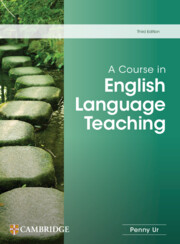Book contents
- Frontmatter
- Contents
- Acknowledgements
- Introduction
- 1 Teaching English today
- 2 The lesson
- 3 Classroom interaction
- 4 Tasks
- 5 Texts
- 6 Teaching vocabulary
- 7 Teaching grammar
- 8 Teaching listening
- 9 Teaching speaking
- 10 Teaching reading
- 11 Teaching writing
- 12 Feedback and error correction
- 13 Assessment and testing
- 14 The syllabus
- 15 Teaching/learning materials
- 16 Teaching content
- 17 Classroom discipline
- 18 Digital technology and online teaching
- 19 Learner differences 1: age
- 20 Learner differences 2: diversity and inclusion
- 21 Teacher development
- Glossary
- References
- Index
- Frontmatter
- Contents
- Acknowledgements
- Introduction
- 1 Teaching English today
- 2 The lesson
- 3 Classroom interaction
- 4 Tasks
- 5 Texts
- 6 Teaching vocabulary
- 7 Teaching grammar
- 8 Teaching listening
- 9 Teaching speaking
- 10 Teaching reading
- 11 Teaching writing
- 12 Feedback and error correction
- 13 Assessment and testing
- 14 The syllabus
- 15 Teaching/learning materials
- 16 Teaching content
- 17 Classroom discipline
- 18 Digital technology and online teaching
- 19 Learner differences 1: age
- 20 Learner differences 2: diversity and inclusion
- 21 Teacher development
- Glossary
- References
- Index
Summary
The language-learning task
A task is defined here as a learner activity that a) aims to enhance learning of some aspect of language, and b) has an outcome that can be discussed or evaluated. It could be a grammar exercise, a problem-solving activity or a writing assignment. It thus excludes tests, which are designed to assess rather than produce learning. Note also that this is a wider definition of the word task than that used in the methodology called ‘task-based language teaching’ (Ellis et al., 2019), which focuses on communicative tasks as a vehicle for language acquisition.
The following are some underlying practical principles of good language-learning task design.
• Validity. The task should activate students primarily in the language items or skills it is intended to teach or practise. This is an obvious principle that is surprisingly often violated. For example, oral fl uency tasks based on full-class discussions actually allow for very little oral fl uency practice by most of the class, as relatively few students get a chance to speak: it's better to divide them into small groups or pairs for this purpose (see 9 Teaching speaking).
• Quantity. Roughly speaking, the more English the students actually understand and engage with during performance of the task, the more they are likely to learn. If the time available for the activity is seen as a container, then this should be filled with as much volume of language and language activity as possible. So you need to make sure that if, for example, you are practising a particular grammatical form, then students repeatedly engage with it (receptively or productively) in different contexts; if you are doing an activity aimed at improving listening, then you need to ensure that the students actually do a lot of listening. And you should try to activate as many students as possible simultaneously rather than one by one, minimizing time spent on classroom management or organization, or on fruitless puzzling out or not knowing. Many word games and puzzles, for example, such as sorting out scrambled words or wordsearches, involve the students spending most of their time looking for, rather than finding, the answers, and waste a lot of potential learning time on not knowing, when they could have been using it for engaging meaningfully with the target vocabulary.
- Type
- Chapter
- Information
- A Course in English Language Teaching , pp. 41 - 53Publisher: Cambridge University PressPrint publication year: 2024

